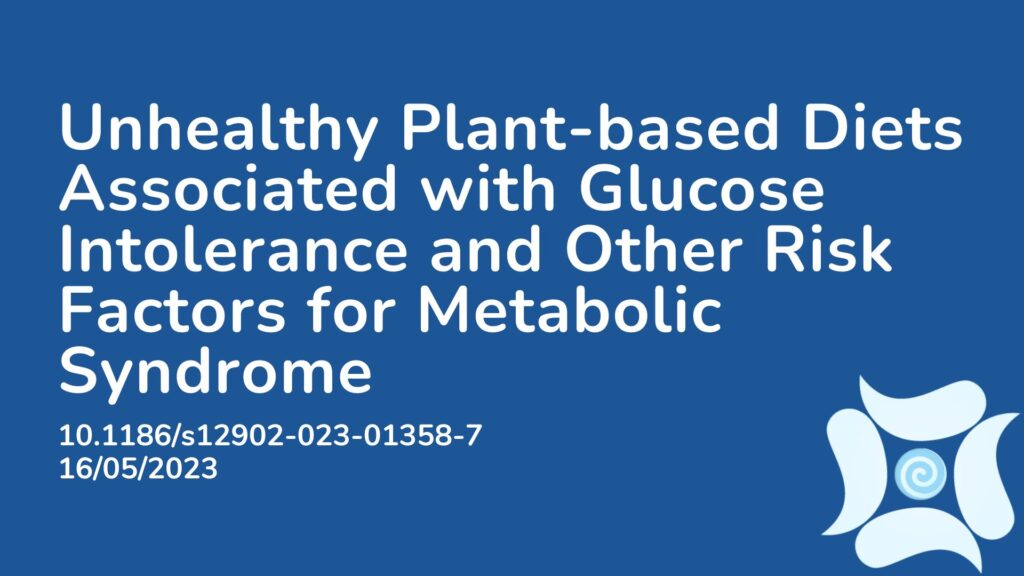Summary:
Metabolic syndrome (MetS) is increasing in prevalence and is a major concern to global health and well-being. MetS is associated with a number of conditions such as obesity, glucose intolerance and hypertension, which are then risk factors for type 2 diabetes and cardiovascular disease. Diet heavily influences risk of MetS so it is imperative that adults are educated and encouraged to improve their diet quality by increasing consumption of healthy food rich in fibre, which is known to prevent cardiovascular and metabolic complications. However, the research available on plant-based diets and risk of MetS is scarce. The aim of this study was to assess risk of MetS when consuming a healthy plant-based diet, as well as an unhealthy plant-based diet in Iranian adults with obesity. A total of 347 adults participated in the study. The results showed that there was no association between overall plant-based diets and MetS, yet participants who consume unhealthy plant-based diets were more likely to have glucose intolerance. The unhealthy plant-based diet group also had higher fasting blood sugar and insulin levels. The study therefore concluded that an unhealthy plant-based diet may modify markers that are then risk factors for MetS.
Abstract:
Background: Metabolic syndrome (MetS) is a common chronic disease with several complications. Given that, studies on the association of plant-based diet indices (PDIs) with risk of MetS among adults with obesity, are limited, we aimed to examine the association between PDIs (including overall PDI, healthy PDI (hPDI), unhealthy PDI (uPDI)) and MetS in Iranian adults with obesity. Methods: In Tabriz, Iran, a total of 347 adults between the ages of 20 and 50 participated in this cross-sectional research study. We created an overall PDI, hPDI, and uPDI from validated semi-quantitative food-frequency questionnaire (FFQ) data. To investigate the association between hPDI, overall PDI, uPDI, and MetS and its components, a binary logistic regression analysis was performed. Results: The average age was 40.78 ± 9.23 years, and the average body mass index was 32.62 ± 4.80 kg/m2. There was no significant association between overall PDI (OR: 0.87; 95% CI: 0.54–1.47), hPDI (OR: 0.82; 95% CI: 0.48–1.40), and uPDI (OR: 0.83; 95% CI: 0.87–2.46) with MetS, even after adjustment for confounders. Moreover, our findings showed that participants with the highest adherence to uPDI had a higher chance of hyperglycemia (OR: 2.50; 95% CI: 1.13–5.52). Also, this association was significant in the first (OR: 2.51; 95% CI: 1.04–6.04) and second (OR: 2.58; 95% CI: 1.05–6.33) models, after controlling for covariates. However, in both adjusted and crude models, we did not find a significant association between hPDI and PDI scores and MetS components such as high triglyceride, high waist circumference, low High-density lipoprotein cholesterol, raised blood pressure, and hyperglycemia. Moreover, those in the top tertile of uPDI had higher fasting blood sugar and insulin levels when compared with those in the first tertile, and subjects in the last tertile of hPDI compared with participants in the first tertile had lower weight, waist-to-hip ratio, and fat-free mass. Conclusion: We found a direct significant association between uPDI and odds of hyperglycemia in the whole population of study. Future large-scale, prospective studies on PDIs and the MetS are necessary to confirm these findings.
Article Publication Date: 16/05/2023
DOI: 10.1186/s12902-023-01358-7



